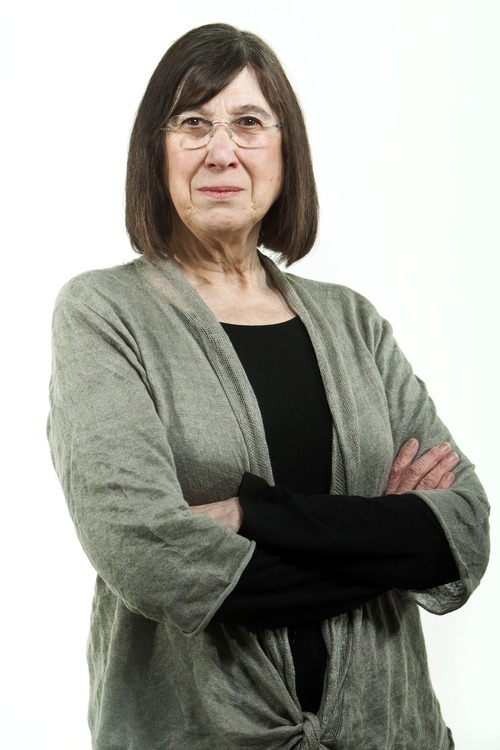This is an archived article that was published on sltrib.com in 2013, and information in the article may be outdated. It is provided only for personal research purposes and may not be reprinted.
Editor's note • This is the first of two parts.
There's something about heroic tales of courage that embody our country's past — especially when bolstered by Yiddishkeit — immigrant stories of determination and verve. Take Fred Linden, who led his family out of Nazi Germany and Shanghai to freedom in Salt Lake City.
Born in 1895 in Prenzlau, capital of the Uckermark District in northeastern Germany, Linden spent his youth surrounded by fields, meadows and woods. He sailed with friends in Lake Uckersee and cultivated a lifelong love of mountain climbing and cross-county skiing.
Linden's's mother, Johanna, was twice a widow. Her first husband died young, leaving her with two girls. Her second husband, Joseph Linden, 32, succumbed to typhoid fever when Linden was barely 1 year old and his brother, Curt, was a toddler. Joseph had owned a men's clothing store.
Johanna married a kind-hearted gentleman, Max Rosenthal, and raised her family and kept the store going.
"I had a very good childhood, a loving mother, vigorous and caring, and a stepfather who was also very good to me," Linden said in interviews and memoirs archived at University of Utah's Marriott Library.
In 1910, the 15-year-old left school to begin a career in textiles and sales. Following in his brother's footsteps, Linden apprenticed at a department store in Cammin, Pomerania, and in early 1914 found work in Stettin, near the Baltic Sea.
"It was a big city offering theater, opera, boat excursions and forests not too far," he said.
But by August 1914, Germany had declared war on Russia and France.
"Curt had to go into the army right away," Linden said. "I'll never forget watching his regiment march to the railway station and walking side-by-side with him to bid farewell."
In 1915, Fred Linden was drafted into the Field-Artillery Regiment No. 38. The next year, his brother was killed in action.
"It was a terribly hard blow for us," Linden said.
A cannoneer trained to ride horseback, Linden's fate was altered by a startled horse.
"Our howitzers were drawn by horses," he said. "Cleaning out the stables, I came too close to one horse, was kicked a hard blow to my belly and knocked unconscious."
Transported to a military hospital, Linden spent months in painful recovery — and learned the edgy steed saved his life.
"That horse was my destiny," he said. "While recuperating, my regiment was transported to the Russian frontier. Not one soul survived."
Once healed and reassigned, Linden delivered munitions closer to the front.
"We rode by night and suffered many casualties," he said.
On Nov. 11, 1918, armistice was declared. A year later, Linden made his way home.
Returning to his trade, Linden skillfully climbed the mercantile ladder. Then, in 1933, Hitler became chancellor of Germany.
"As a Jew, I couldn't work anywhere except in Berlin," he said. "In contrast to smaller cities where Jews were being persecuted and even transported to concentration camps, Berlin was an oasis."
Linden opened a shop and made a sale within hours. "It was good omen," he said. He met and married Ruth Salomon. They had a son, Kurt Joseph.
"We lived 15 minutes from our store and felt homelike," Linden said. "My wife was a wonderful companion and partner. Our business was flourishing."
But there was no negotiating with the Nazi regime.
"I applied for immigration, often but couldn't get visas," Linden said. After Nov. 9-10, 1938, there was no going back.
During the two-day pogrom called Kristallnacht — a state-sanctioned, violent attack against Jewish communities in Germany — Nazi storm troopers destroyed thousands of Jewish-owned stores and homes, set fire to synagogues, killed scores of Jews and arrested and deported some 30,000 Jews to concentration camps.
"Returning to open our store the next morning and seeing the shattered windows, swastika-painted walls and destroyed merchandise, I boarded the door," Linden said.
He tried again and at the last possible moment was "lucky to get tickets on a ship to Shanghai."
Their possessions were confiscated. By April 1939 they were gone.
Eileen Hallet Stone, oral historian, may be reached at ehswriter@aol.com. Special thanks to Dr. Kurt J. Linden, Wayland, Mass. —
Editor's note: This is the first in a two-part series.



